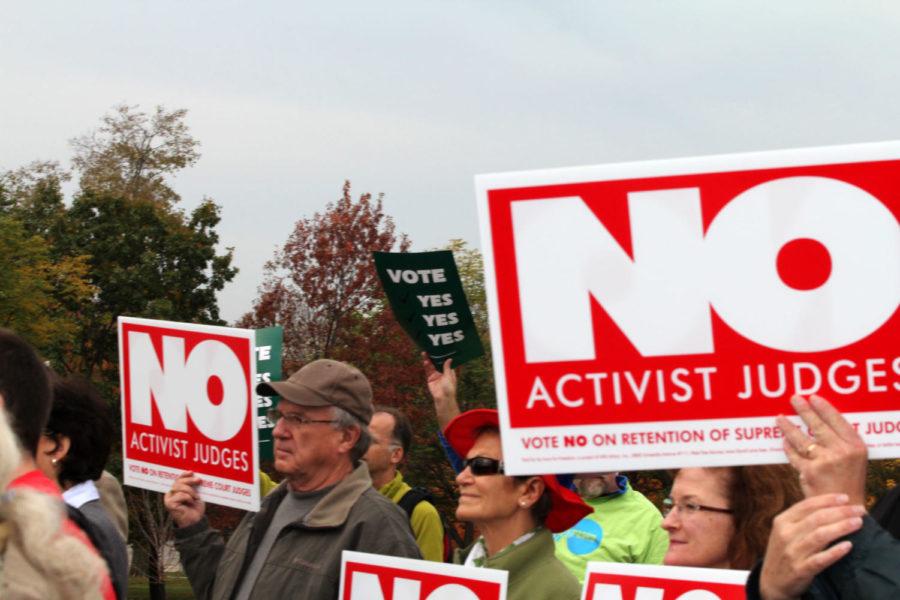Belding: As judicial retention vote looms, role of judicial review should be obvious
Photo: Tyler Kingkade/Iowa State Daily
Supporters gather Monday morning in Des Moines to hear Rep. Steve King, R-Iowa, and the leaders of the Family Research Council and National Organization for Marriage speak about why they support a ‘no’ vote on the retention of three of Iowa’s Supreme Court justices and why gay marriage should not be legal. A counter-protest was also held, and some stayed to display signs reading “Vote Yes, Yes, Yes.”
August 21, 2012
As clear as crystal and without question, courts such as the Supreme Court of the United States and the Iowa Supreme Court are vested with the power to determine whether a law is constitutional and, if it is not, to strike it down. Nevertheless, with another judicial retention vote drawing near among the elections of Nov. 6, the Family Leader has launched a campaign, begun on Saturday, Aug. 8, against Iowa Supreme Court Judge David Wiggins.
That effort is a continuation of their campaign of 2010.
The backstory, in brief, is that on April 1, 2009, the Iowa Supreme Court ruled in the case Varnum v. Brien that Iowa’s definition of marriage as a relationship between a man and a woman violated equal protection guarantees in the state constitution. Conservatives such as Bob Vander Plaats saw in the case an example of judicial activism, and supporters of traditional marriage congregated at the capitol building to demand a constitutional amendment defining marriage to be between a man and a woman so they could then vote on it. While they shouted “Let us vote!” from the rotunda, marriage equality groups such as OneIowa held dueling protests.
In the next year’s elections, three of the seven judges were up for their usually nonpartisan retention votes. Groups associated with Vander Plaats and the Family Leader, such as Iowa for Freedom, ran a campaign to reject the retention of Chief Justice Marsha Ternus and judges David Baker and Michael Streit. They were successful.
In a move similar to that of Vander Plaats the Chairman of the Republican Party of Iowa, A. J. Spiker, issued a statement on Aug. 1 encouraging Iowans to vote against Wiggins’s retention because “we must be a state based on laws and not the whims of unelected activist judges attempting to impose their personal views on the public. … Instead of allowing the people of Iowa to decide this issue at the polls, these judges instead chose to impose their will upon the state and rewrite history without weighing the merits of our laws and values.”
Aside from the fact judges are not bureaucrats or their ruling was arbitrary (for the love of God, read it for yourself rather than just taking my or anyone else’s word for it; the Iowa Supreme Court carefully cited case after case and constitutional provision after constitutional provision in making the ruling), such attitudes reflect either a genuine misunderstanding of constitutional principles or a rejection of the power of judicial review despite the easy accessibility of explanations from the founders of what role the judiciary should play.
Formally, the power of judicial review has existed since the Marbury v. Madison decision of 1803, in which Chief Justice John Marshall wrote: “It is emphatically the province and duty of the judicial department to say what the law is. Those who apply the rule to particular cases, must of necessity expoud and interpret that rule. If two laws conflict with each other, the courts must decide on the operation of each.”
Alexander Hamilton, writing with John Jay of New York and James Madison of Virginia (who is credited with writing the document) in 1787 and 1788 to support the U.S. Constitution’s ratification, devoted six of the 85 Federalist Papers to the judiciary, and explained fully its role in a constitutional system as well as its relationship to the executive and legislative branches.
Although Hamilton admitted the principles of Marshall’s Marbury ruling are not written explicitly into the the Constitution, he argued judicial review was, simply, the judiciary’s function. In Federalist 81 he wrote: “There is not a syllable in the plan which directly empowers the national courts to construe the laws according to the spirit of the Constitution or which gives them any greater latitude in this respect than may be claimed by the courts of every State. I admit, however, that the Constitution ought to be the standard of construction for the laws, and that wherever there is an evident opposition, the laws ought to give place to the Constitution.”
The writers of the Iowa constitution upheld that conviction. Article XII, Section 1 of our state’s governing document states: “This Constitution shall be the supreme law of the state, and any law inconsistent therewith, shall be void. The general assembly shall pass all laws necessary to carry this constitution into effect.”
The power of judicial review, Hamilton believed, was obvious, implied in the very existence of a judicial branch: “This doctrine is not deducible from any circumstance peculiar to the plan of the convention, but from the general theory of a limited Constitution; and as far as it is true is equally applicable to most if not to all the state governments.”
As citizens of the republic of the United States, they ought to know better in the face of such obvious proofs. As Republicans, members of the party of Lincoln and Roosevelt, they ought to know better than to set a precedent that would allow judges to be removed from office because a million uneducated voters thought they were legal experts.
Instead, they favor electoral democracy to the rule of law. Their campaigns show that they prefer court decisions ratified by the masses to opinions written by judges chosen by a professional group of lawyers after distinguishing themselves as legal scholars.

















